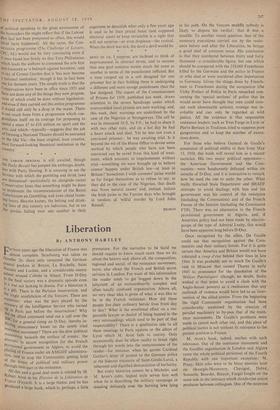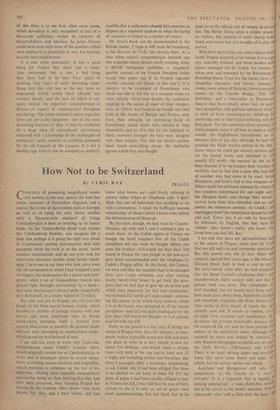Liberation
By ANTHONY HARTLEY
FIFTEEN years ago the liberation of France was almost complete. Strasbourg was taken on October 26; there only remained the German coastal pockets at Royan, La Rochelle, Saint Nazaire and Lorient, and a considerable enemy salient around Colmar in Alsace. From D-Day to the final victory was a dramatic episode even !r1 a War not lacking in drama. For a historian it is a gift. There is the Parisian insurrection, and the tragic annihilation of the Vercors. There are inYsteries: what was the part played by the etilIlissarY of the Intelligence Service who turned dr,,In Paris just before the insurrection? Why Bfl the allied command send out a call over the fli C. for a general rising on D-Day, thereby eng unnecessary losses on the sorely tried resistance movement? There are the slow political manoeuvres -'etivres beneath the surface of events: the attempts to secure recognition for the French Provisional government in Algiers, to avoid the placing of France under an AMGOT administra- tion, and to stop the Communists getting hold of the levers of political and military power through their part in the resistance. All this and a good deal more is related by M. Robert Aron in his Histoire de la Liberation de PraHce (Fayard). It is a large theme, and he has Produced a large book, which is, perhaps, a little premature. For the narrative to be lucid we should require to know much more than we do about the history and, above all, the composition, regional and social, of the resistance movement; more, also about the French and British secret services in London. For want of this information the reader tends to get bogged down in the labyrinth of an extraordinarily complex and often totally confused organisation. Above all, no very clear idea is given of what it was like to be in the French resistance. How did these people live their ordinary heroic lives from day to day? What is the emotional effect on a res- pectable lawyer or doctor of being hunted in the very surroundings which used to be part of that respectability? There is a qualitative side to all these meetings in Paris squares or the alleys of Lyon which M. Aron fails to convey. Only occasionally does he allow reality to break right through his words into the consciousness of the reader—for instance, when he quotes Cardinal Gerlier's letter of protest to the German police at the hideous massacre of Saint-Genlis-Laval, a vehement and dignified denunciation of barbarity.
But every historian cannot be a Michelet, and M. Aron's calm, logical style serves him well when he is describing the military campaign or treading delicately over the burning lava lying in his path. On the Vercors muddle nobody is likely to dispute his verdict : that it was a muddle. To another vexed question, that of the summary executions carried out by the resist- ance before and after the Liberation, he brings a good deal of common sense. His conclusion is that they numbered between thirty and forty thousand—a considerable figure, but one which should be compared with the 254,000 Frenchmen killed by the Germans and the milice in France or who died or were murdered after deportation to Germany. Given the things done by French- men to Frenchmen during the occupation (the Vichy Prefect of Police in Paris remarked con- cerning the 'special sections' of police that he would never have thought that men could com- mit such abominable actions), revenge was in- evitable and can only be regarded as wild ' justice. All the evidence is that responsible resistance leaders, such as Yves Farge in Lyon or Pierre Bertaux in Toulouse, tried to suppress pure gangsterism and to keep the number of exedu- tions down.
For those who believe General de Gaulle's possession of political ability to date from May 13, 1958, this book will reveal him as a master tactician. His two major political opponents— the American Government and the- Com- munists—were handsomely defeated within six months of D-Day, and it is instructive to remark how he used the one to undo the other. What really thwarted State Department and SHAEF attempts to avoid dealings with him and his government was his control of the resistance (including the Communists) and of the French Forces of the Interior (including the Communist FTP). There was no alternative to the French provisional government in Algeria, and, if American policy had not been made by nincom- poops of the type of Admiral Leahy, this would have been apparent long before D-Day.
Once recognised by the allies, De Gaulle could use that recognition against the Com- munists and their military forces. For it is quite certain that America and Britain would not have tolerated a coup d'etat behind their lines in late 1944. It was probably not so much De Gaulle's visit to Moscow that caused Thorez in early 1945 to pronounce for the dissolution of the Milices Patriotiques' (though, no doubt, Stalin wished at that point to avoid a clash with the Anglo-Saxon powers) as a realisation that any outbreak of violence would have led to an inter- vention of the allied armies. From the beginning the rigid Communist organisation had been considerably weakened by the creation of parallel machinery to by-pass that of the resist- ance movements. De Gaulle's problems were made to cancel each other out, and this piece of political tactics is not without its relevance to the present position in France.
M. Aron's book, indeed, seethes with such relevance. Out of the resistance movement and the Gaullist organisation in London and Algiers came the whole political personnel of the Fourth Republic with one important exception : M. Pinay. Men who were to be bitter enemies later on (Bourges-Maunoury, Chevigne, Debre, Soustelle, Bourdet, Bidault, Farge) fought on the same side in the intimacy which clandestine action produces between colleagues. One of the surprises of this story is to see how often some name, which nowadays is only recognised as that of a disastrous politician, occurs in contexts of resourcefulness and heroism. In peace France could have done with some of the qualities which were displayed so plentifully in war, but heroism is easier than steadfastness.
It is also more destructive. It was a good thing for France that there was a resist- ance movement, but it was a bad thing that there had to be one. Four years of plotting, four years of strife becoming some- thing very like civil war at the end, were an experience which would have affected any country deeply, and the lack of which is cer- tainly behind. the imperfect comprehension in Britain of aspects of contemporary European psychology. The habits learned in secret organisa- tions are not easily forgotten : one of the most disturbing features of May 13 was its revelation of a large class of unemployed adventurers endowed with a knowledge of the techniques of conspiracy vastly superior to anything possessed by the old Cagoule or the Leagues. It is not a healthy sign when it can be accepted as perfectly credible that a millionaire should hire assassins to dispose of a wayward nephew or when the hiring of assassins is treated as a matter of course.
M. Aron's book can be recommended to the British reader; I hope it will soon be translated, as his Ilisioire de Vichy has already been. At a time when mutual comprehension between our two countries seems almost totally wanting, when a British newspaper publishes a singularly ignoble cartoon of the French President (what would that paper say if its French opposite number attacked the Queen in this way?), it is salutary to be reminded of Frenchmen who chose our side in the war at a moment when we were entirely alone and despite the confusion reigning in the minds of most of their compat- riots. In 1940 it was General de Gaulle who had faith in the future of Britain and France, and, from then onwards, an increasing band of Frenchmen risked death with torture to help themselves and us. For this we are indebted to them, however strongly we may now disagree with their policies. For this we should pardon them much—everything except the barbarity against which they once fought.















































 Previous page
Previous page